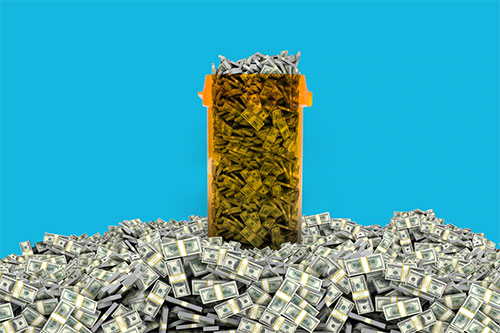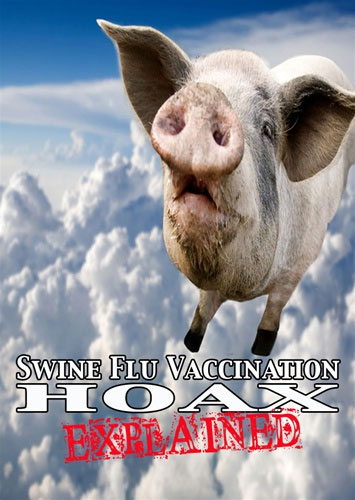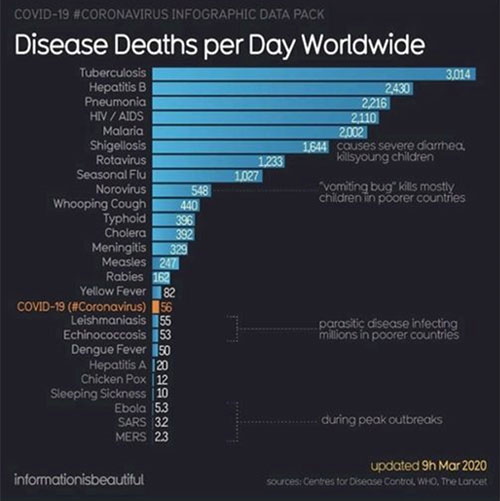The swine flu ‘pandemic’ was officially a hoax, corona virus probably is too. Big Pharma stands to profit, again
Just in case anyone doesn’t understand why you can, or should, be skeptical about the severity of the alleged threat from the coronavirus.

As it played out between early 2009 and late 2010, the ‘swine flu’ pandemic is estimated to have infected up to 1.4 billion people around the world and killed anywhere between 150,000 and 575,000 (‘the flu’ is almost never recorded as the cause of death on certificates). While many governments did, at the time, talk up the threat from that virus, there was nothing like the level of hysteria that we are seeing today in relation to ‘corona virus’. Today, many political leaders are talking in overwrought, impassioned terms about the corona virus that are completely disconnected from the actual infection rates and fatalities it has caused.
Consider UK Prime Minister Boris Johnson’s statement that this is “the worst public health crisis for a generation” and that “this disease is more dangerous and it’s going to spread further … more families are going to lose loved ones before their time.” Johnson’s statement is patently false. The corona virus is NOT, as of now, “the worst public health crisis for a generation”. By July 2009 (after which routine testing was discontinued) there were more than 24,000 laboratory confirmed cases of swine flu in England and Scotland and 392 deaths. Just a few months previously, the British government claimed that 65,000 people could die.
Yes, it is likely that more British people (the elderly and those with underlying health issues) will succumb to the corona virus, but many more will die as an indirect result of the seasonal flu. Why is the seasonal flu not being characterized as the “worst health crisis in a generation”? Is it simply because it happens every year? Or is it because there is already a well-oiled system providing big-pharma produced flu shots that are given to 1.5 million Britons every year? While Johnson’s comments could be construed as ‘responsible leadership’, they are in fact highly irresponsible, and most likely the product of cynicism and opportunism.
Virus hysteria means big pharma banks your cash
In January 2010, Wolfgang Wodarg, a German deputy who trained as a physician and now chairs the health committee at the Council of Europe, claimed major firms had organised a “campaign of panic” around swine flu to put pressure on the World Health Organization (WHO) to declare a “false pandemic” to sell vaccines. Wodarg said the WHO’s “false pandemic” flu campaign is “one of the greatest medicine scandals of the century”. He said that the “false pandemic” campaign began in May 2009 in Mexico City, when a hundred or so “normal” reported influenza cases were declared to be the beginning of a threatening new pandemic, although he said there was little scientific evidence for this. Nevertheless, he argued that the WHO, “in cooperation with some big pharmaceutical companies and their scientists, re-defined pandemics”, removing the statement that “an enormous amount of people have contracted the illness or died” from its existing definition and replacing it by stating simply that there has to be a virus, spreading beyond borders and to which people have no immunity.
In March 2010, the Council of Europe launched an inquiry into “the influence of the pharmaceutical companies on the global swine flu campaign”, the findings of which made interesting reading. “The tentacles of drug company influence are in all levels in the decision-making process,” said Paul Flynn, then a UK Labour MP who sat on the Council’s health committee. “It must be right that the WHO is transparent because there has been distortion of priorities of public health services all over Europe, waste of huge sums of public money and provocation of unjustified fear.”

Although the experts consulted made no secret of industry ties in other settings, declaring them in research papers and at universities, the WHO itself did not publicly disclose any of these in its seminal 2004 guidance. In its note, the WHO advised: “Countries that are considering the use of antivirals as part of their pandemic response will need to stockpile in advance.”
A 2010 investigation by the British Medical Journal and the Bureau of Investigative Journalism showed that WHO guidance issued in 2004 was authored by three scientists who had previously received payment for other work from Roche, which makes Tamiflu, and GlaxoSmithKline (GSK), the manufacturer of Relenza (another anti-flu drug). Pharmaceutical companies are estimated to have banked more than $7bn as governments stockpiled drugs to combat swine flu.
On 12 April 2010, Keiji Fukuda, the WHO’s top influenza expert, stated that the system leading to the declaration of a swine flu pandemic led to confusion about the virus circulating around the world, and he expressed concern that there was a failure to communicate in regard to uncertainties about the new virus, which turned out to be not as deadly as feared.
In June 2010, Fiona Godlee, editor-in-chief of the BMJ, published an editorial which criticized the WHO, saying that an investigation had disclosed that some of the experts advising WHO on the pandemic had financial ties with drug companies which were producing antivirals and vaccines. Margaret Chan, Director-General of the WHO, replied stating, “Without question, the BMJ feature and editorial will leave many readers with the impression that WHO’s decision to declare a pandemic was at least partially influenced by a desire to boost the profits of the pharmaceutical industry.”
Because there were already drugs available to treat swine flu, there was little need to prolong the hysteria about that particular virus beyond the initial propaganda, and governments around the world spent $billions stockpiling what big pharma had to offer. Coronavirus is different in that there is, as yet, no ‘cure’ for the illness (just wait a while). As a result, the hysteria must be artificially prolonged until the likes of Johnson & Johnson and Pfizer can cobble something together. Until then, many countries are taking ridiculously extreme measures like banning all public events, closing schools for months, and insisting that entire populations stay indoors (or ‘shelter in place’ if you prefer) until further notice.
You may have noticed the Trump administration’s recent announcement of a ban on all travel from the EU, except for the UK and Ireland. This was likely a calculated political ploy in an attempt to court the local governments and peoples and enhance the perception of a ‘special relationship’ between the two (or three) countries, specifically as it relates to health care. It is no secret that the British government is in the process of negotiating an ‘awesome’ trade deal with the US in the aftermath of ‘Brexit’. It is also no secret that part of that trade deal will include US big pharma access to the UK’s National Health Service and, most likely, a many-fold increase in the price of UK prescription drugs to match their exorbitant cost in the US.
In the interest of bringing some perspective back to the current alarmism over corona virus, check out this graphic of the illnesses that are the major causes of deaths, per day, around the world and, if you must, prioritize protecting yourself from yellow fever before taking action on corona virus.

yogaesoteric
April 21, 2020
